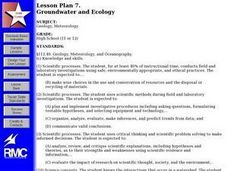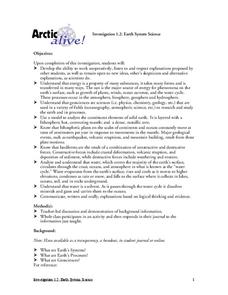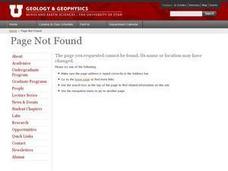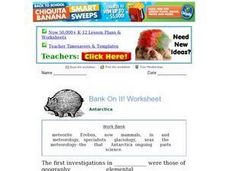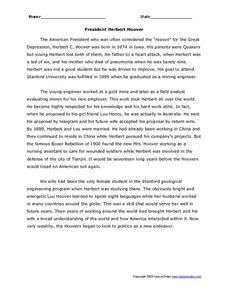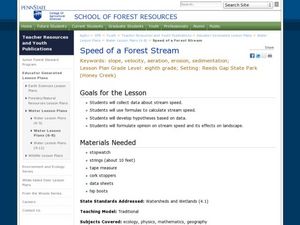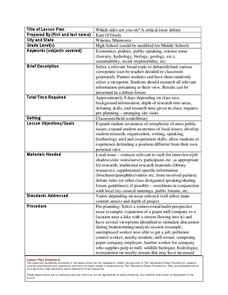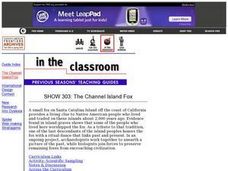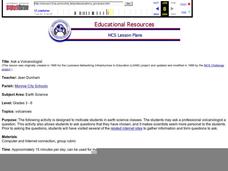Curated OER
Anthropology and Sociology
Students examine the combined subjects of anthropology and sociology and explain how the disciplines would study the same issue. On poster board, they locate or draw pictures related to the two subjects. Once this is completed, students...
Curated OER
Relative Dating - Telling Time Using Fossils
Learners use fossil range charts to explain relative dating. They graph for ammonites, marine organisms that went extinct at the same time as dinosaurs.
Curated OER
Groundwater and Ecology
Students are presented a problem concerning an aquifer which may be in danger from overuse by agriculture/industry. They compile data and consult online data and experts in creating a proposal to rectify the situation.
Curated OER
Earth System Science
Students explore the Earth and its ability to support life. They discuss the geosphere and the water cycle and complete the Water Wonders activity. After completing the activity, they respond in their journals and reflect upon the...
Curated OER
Mapping Where Animals Live
In this animal mapping worksheet, learners read a short passage about amphibians and reptiles in New York State, then use a set of maps to answer related questions.
Curated OER
Volcanoes:How Safe Are They?
Students explore volcanoes, locate them on maps, record general information about volcanoes, and organize information on a fact sheet.
Curated OER
Days of '49: "I've Been Toiling Hard for the Last Two And a Half Years"
Students trace the stages of gold mining in California. They discuss the life of a gold miner and how the discovery of gold influenced towns and cities in California during the 1949 Gold Rush.
Curated OER
Shells on the Mountain Top?
Students work in groups to remove fossils from sediments, classifying as many organisms and parts of organisms as possible into major groups. They study the data from each formation and make conclusions about the types of organisms and...
Curated OER
EWOC2006-Make your own weather forecast - WEST
Students explore making their own weather forecast. They view and discuss a forecasting PowerPoint presentation. Students analyze radar and satellite imagery. They compile many ways to observe clouds.
Curated OER
Bank On It! Antarctica
In this vocabulary worksheet, students read an informational paragraph about Antarctica. Students then fill in the 17 blanks with words from the word bank.
Curated OER
President Herbert Hoover
In this President Herbert Hoover worksheet, students read a 4 page article on the history of Hoover's life and presidency and then answer 10 true and false questions.
Curated OER
Scientific Method
In this scientific method worksheet, students read and discuss a 2 page article on the scientific method, match 3 founders of the scientific method with what they found or produced, answer 4 statements as true or false, list 3 crucial...
Curated OER
Speed of a Forest Stream
Pupils study stream speed. In this stream speed instructional activity students complete an activity and formulate an opinion and study its effects.
Curated OER
Internet Quest-Drops to Oceans
Students examine facts about water. In this water activity, students complete a WebQuest to study the properties of water. There is an WebQuest activity page included in this lesson plan.
Curated OER
Which Sides Are You on? A critical Issue Debate
Students study public issues and become more aware of local issues. For this economics lesson students are given some local controversial issues and several viewpoints to analyze. They then research and review the topic with the class.
Curated OER
SHOW 303: The Channel Island Fox
Students explore how archaeologists and other scientists use different clues to piece together a picture of the past. Students perform activities that allow them to conduct three types of scientific research. They discuss their...
Curated OER
Ask a Volcanologist
Students ask a professional volcanologist a question online. This lesson allows students to ask questions that they have chosen, and it makes scientists seem more personal to Students.
Curated OER
Dinosaur I Finding And Dating
Students investigate how long dinosaurs lived on Earth and how that compare to how long man has been on Earth. They discover how scientists excavate fossils.
Curated OER
Plotting the Petroleum Plume
Eighth graders examine the difference between confining layers and aquifers in a basic water table aquifer scenario. They contour groundwater elevation and petroleum product thickness data.
Curated OER
How to Recycle a Rock
Third graders explore the rock cycle and explore how rocks are made, changed, destroyed and recreated. They create representations of these processes with hands-on activities.
Curated OER
Soil Science Study
Students complete an activity by looking and gathering data on plants and soils.
Curated OER
The Respiratory System
Students explore the parts of the respiratory system in this six lessons unit. The lessons presnt the concepts of the breathing, the function of oxygen in the system, how sounds are made, and the effects of pollution, smoking and disease...
Curated OER
Streamflow
High schoolers discuss the topic of streamflow and how it occurs. They take measurements and analyze them. They interpret data and create their own charts and graphs.



